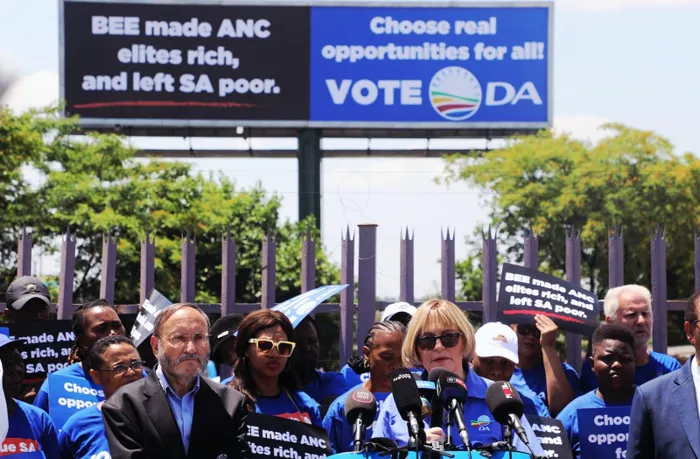Political storm brews as DA's anti-BEE billboard takes aim at the ANC

The Democratic Alliance in Joburg unveiled a Billboard on Tuesday that follows up on their anti-BEE bill. The Billboard can be seen from the N1 north near Strydom Park. It reads " BEE made ANC elites rich and left SA poor".
Image: Pictures: Timothy Bernard / Independent Newspapers
A political firestorm has erupted in the country, exposing deep ideological differences within the Government of National Unity (GNU), following the DA’s controversial launch of a billboard on Johannesburg's bustling N1 highway.
The billboard, emblazoned with the provocative slogan "BEE made ANC elites rich, and left SA poor. Choose real opportunities for all! Vote DA," has drawn the immediate condemnation of the ANC, signaling a renewed clash between the GNU's two largest political entities.
The public statement by the DA, which took aim directly at the ANC's flagship Broad-Based Black Economic Empowerment (BEE) policy, has effectively reignited long-standing debates about economic transformation and redress in a country still grappling with the profound legacies of apartheid.
Mat Cuthbert, the DA's head of policy, defended the billboard's message.
"This advertisement is telling the truth about what many South Africans already supposedly know – that BEE has failed under the ANC," Cuthbert said on Tuesday.
He painted a stark picture of the policy's alleged shortcomings.
"It has made a handful of politically connected individuals wealthy, while the rest of the country has been left behind. For three decades, this policy has been sold as empowerment, but it has delivered the opposite."
Cuthbert's critique extended to the societal impact, highlighting widespread economic hardship.
"Millions remain locked out of the economy, with 12 million South Africans unable to find work and 44 million struggling just to afford their next meal. While a few benefit from inflated contracts and state tenders, the majority continue to pay the price for corruption and greed.”
The DA's billboard campaign is not merely a critique; it is a preamble to a proposed legislative overhaul. The party is advocating for the replacement of BEE with its "Economic Inclusion for All Bill," which it launched just last week and it urged the ANC to support.
This proposed legislation seeks to amend the Public Procurement Amendment Act of 2024, specifically targeting the repeal of all race-based preferential procurement provisions.
In its place, the DA proposes an empowerment system that would pivot to poverty as the proxy for disadvantage, rather than race.
"We aim to reform South Africa’s public procurement framework by aligning it with Section 217 of the Constitution, which governs public procurement, requiring that all State organs must contract for goods and services in a system that is fair, equitable, transparent, competitive, and cost-effective,” Cuthbert explained at the time of the Bill's launch.
He said the DA’s Bill would remove provisions for set-asides, prequalification criteria, subcontracting conditions, and local content designations, replacing them with an "outcomes-driven system centred on inclusive development and value-for-money procurement".
The transitional measures outlined in the DA's Bill include the winding down of the BEE Commission over 12 months and the systematic removal of references to BEE across existing legislation.
“Unlike the ANC’s system that encourages fronting and patronage, the DA’s approach focuses on need, fairness, and tangible empowerment.
The ANC's national spokesperson Mahlengi Bhengu did not respond to questions but a National Executive Committee (NEC) member described the new billboard as 'cheap politics by the DA'.
“We are on the eve of elections and so the DA has launched their campaign... there is nothing wrong with that…it's just cheap politics on their part to challenge ANC policies in the streets,” the NEC member said.
ANC President Cyril Ramaphosa last week, made it clear that the existing BEE policy would not be dismantled.
"Currently, we have a BEE policy that is rooted and underpinned by our Constitution, so if anyone wants an amendment to the BEE Act, they must table their proposals, and they must be taken for discussion in Parliament. At the moment, BEE policies, legislation, and regulation apply, without any dilution whatsoever.”
Adding its voice to the debate, the Congress of South African Trade Unions (Cosatu) rejected the DA's call last week, describing it as "naive".
Cosatu spokesperson Matthew Parks affirmed the federation’s unwavering support for BEE's "progressive objectives," asserting its "fundamental necessity in a country still grappling with the legacies of systematic discrimination".
"As long as South Africa remains scarred by the painful legacies of exclusion, then transformation legislation such as B-BBEE and Employment Equity will continue to be critical tools to overcoming our still entrenched levels of poverty and inequality,” Parks added
Cosatu dismissed claims of BEE solely enriching a few connected individuals as "long debunked fairy tale claims," citing the success of Employee Shareholder Ownership Programmes (ESOPs) as a key component that has empowered 500,000 workers of all races to become shareholders, boosting their incomes and promoting inclusion.
mashudu.sadike@inl.co.za
Related Topics: